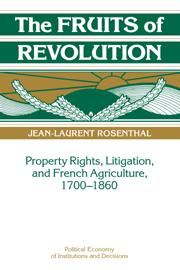Book contents
- Frontmatter
- Contents
- List of tables, figures, and maps
- Series editors' preface
- Preface
- 1 Introduction
- PART I HISTORY AND ECONOMICS
- PART II DRAINAGE AND IRRIGATION
- PART III PROPERTY RIGHTS AND LITIGATION UNDER ABSOLUTISM
- 8 The weaknesses of monopoly power
- 9 Settlement, litigation, and the drainage of marshes in England and France, 1600–1840
- 10 Conclusion
- Appendix 1 Wages, land prices, and interest rates
- Appendix 2 Estimating rates of return
- Appendix 3 Theoretical proofs
- Bibliography
- Index
10 - Conclusion
Published online by Cambridge University Press: 27 March 2010
- Frontmatter
- Contents
- List of tables, figures, and maps
- Series editors' preface
- Preface
- 1 Introduction
- PART I HISTORY AND ECONOMICS
- PART II DRAINAGE AND IRRIGATION
- PART III PROPERTY RIGHTS AND LITIGATION UNDER ABSOLUTISM
- 8 The weaknesses of monopoly power
- 9 Settlement, litigation, and the drainage of marshes in England and France, 1600–1840
- 10 Conclusion
- Appendix 1 Wages, land prices, and interest rates
- Appendix 2 Estimating rates of return
- Appendix 3 Theoretical proofs
- Bibliography
- Index
Summary
A historian's opinion of the Revolution's economic consequences is frequently forged from the archival material he or she has to rely on. To a historian interested in trade, the dramatic fall in activity after 1789 in ports like Bordeaux and Marseille speaks of economic decay and Revolutionary failure. On the basis of such evidence, Alfred Cobban in The Social Interpretation of the French Revolution gave a scathing review of the economic consequences of 1789. But for a historian who focuses on agriculture, the quiet that fell on the countryside after 1800 speaks of an end to the long-running tensions that had plagued the eighteenth century. To be sure, the post-1789 countryside was no Eden, but landowners were now able to go about their business unencumbered by the tangle of property rights that had been the hallmark of the Old Regime.
Cobban focused on the short run to understand whether the Revolution had improved the lot of those who had witnessed it. For the immediate post-Revolutionary period, his conclusions seem valid: “France was worse off in 1815 than she had been in 1789.” In this book, however, the focus has been on the long run. From this perspective, it seems just as clear that the French economy improved as a result of Revolutionary reform. Cobban's conclusion, after all, was derived from the implicit assumption that all the economic tragedies that unfolded between 1789 and 1815 were direct consequences of the Revolution. Yet any short-run evaluation of the Revolution is saddled with the problem of assigning the cost of the wars that raged between 1792 and 1815.
- Type
- Chapter
- Information
- The Fruits of RevolutionProperty Rights, Litigation and French Agriculture, 1700–1860, pp. 171 - 179Publisher: Cambridge University PressPrint publication year: 1992

